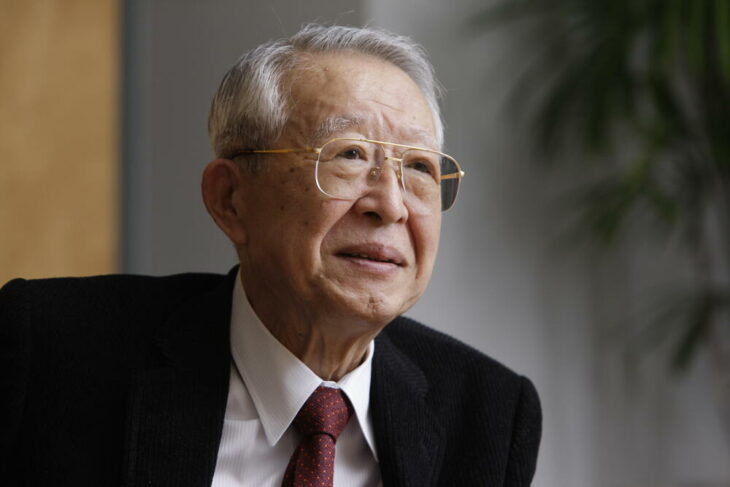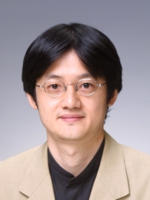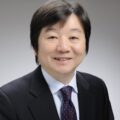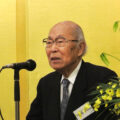In Memoriam: Yamazaki Masakazu – The Modern State and Charlie Brown
Karube Tadashi, Professor, University of Tokyo

Yamazaki Masakazu, Ph.D.
Playwright and Critic
Born 1934 in Kyoto Prefecture. He completed the doctoral course at the Kyoto University Graduate School, specializing in aesthetics. He served as a professor at Kansai University and Osaka University, and was the President of the University of East Asia. In 2006 he was made a Person of Cultural Merit and awarded the Order of Culture in 2018. His best-known plays are Zeami, Oedipus Shoten (The ascension of Oedipus) and The man who captured Eichmann—words. His many written works include Gekiteki naru nihonjin (Japanese, as Theoretical People), Yawarakai kojinshugi no tanjo (Birth of soft individualism), Shako suru ningen (Homo Sociabilis: Sociability and Human Beings), Soshoku to dezain (Decoration and design) and Rizumu no tetsugaku noto (Notes on the philosophy of rhythm).
Photo: ©2013 H.Endo
It was a day not long after the US Al-Qaeda terror attacks of September 11, 2001. People who spoke of the attacks still bore strained expressions, so less than a week afterwards, I think. And it was around that time that I first had the pleasure of meeting Yamazaki Masakazu at a seminar run by The Suntory Foundation. This was the “Modern State and Ethics” seminar led by the late Sakamoto Takao.

Prof. Karube Tadashi
That day the seminar was held in Osaka and, after the discussion finished we went to eat out, where I encountered Yamazaki as we all chatted. Of course the talk was of the terrible events in New York and focused on how the international situation might develop. Most people there seemed anxious as they talked but Yamazaki alone was quiet, in fact slightly cheerful. He commented that the attacks might make good material for a Hollywood film. If one of the passengers and an air traffic controller were lovers, he said, it would be an interesting movie.
Hearing that, I was shocked. To be precise, I remember being lost for words at such inappropriate humor. Yet in fact, later on a film was made based on the attacks, so Yamazaki’s prediction turned out to be correct. Unlike most people, who were thrown into confusion by the reporting on this unprecedented terror attack, Yamazaki saw the event like everything that happens in the world as a scene from a play. This struck me as truly a playwright’s way of thinking. And this way of thinking can surely be found running right through Yamazaki’s works, from his first collection of criticism Gekiteki naru nihonjin (Japanese, as Theoretical People) to Yawarakai kojinshugi no tanjo (Birth of soft individualism) and Shako suru ningen (Homo Sociabilis: Sociability and Human Beings). This huge incident in world history spurred his ideas on human beings and the theater into dynamic life. I witnessed a hugely important moment.
Nevertheless, if we also consider an essay that Yamazaki published about six months before that, we see another side to his character. The American comic strip Peanuts, featuring the characters Snoopy and Charlie Brown, had finally finished after a long fifty years of publication. The essay in response to this news was called “Goodbye Snoopy” and was carried in the January 23, 2000 edition of the Nihon keizai shimbun [currently The Nikkei] (republished in 2001 as part of Reading the 20th Century, The Asahi Shimbun Company.)
In this, Yamazaki wrote about his memories of encountering the comic strip in 1965 when he first lived in the United States. Everyone engaged in ongoing and fierce competition based on “a positive attitude.” As a result, it was a society full of confidence and which enjoyed wealth. But as Yamazaki spent time living in the United States, a country he thought he “had to brace [myself] for, but had to visit,” he actually began to feel that there was a “different world” lurking behind the scenes. It was Peanuts that supported this realization and destroyed his preconceptions.
“For example, Charlie Brown is always trying to make his own games. He gets his friends excited, creates a situation, encourages himself, and tries to get things together. Contrary to Umberto Eco’s famous and mistaken interpretation, he doesn’t feel in the slightest bit isolated or inferior. He aims to maintain a small unit of friends and, for example, even if he loses a game, he achieves that. Even when he is made fun of, if his friends feel better he more than fulfills his role as the leading character in that cast. He doesn’t give up and he doesn’t stand by. He is so positive that he almost seems comical. That’s the hidden soul of this powerless hero.”
Compared to Snoopy with his endless idealism, Charlie Brown keeps patiently working to maintain his “small unit of friends.” In the United States, Yamazaki saw people fully aware of their powerlessness, but who wouldn’t descend into cynicism. They were “so positive [they] almost seemed comical” and “tried to get things together.” “…and during that period, my Japan-US war steadily marked its own end,” was Yamazaki’s casual comment. But there was deep meaning in this.
In his journal of American experiences, This America (Kawade Shobo, 1967) Yamazaki records the pathetic toil that forms part of people’s everyday lives. These men and women work hard at business, strive for cheerful social relations, and try to maintain a perfect home life. Sometimes however, the shadow of lonely toil lurks behind their smiles. He described that shadow in his book, which is quite different to other books written by Japanese people about the United States at the time. When a Kawade Bunko compact paperback edition was published in 1984, the English title on the cover was THIS AMERICA THIS. The hesitant tone of repeating “this” well expresses his shock at having discovered something.
For Yamazaki, the United States wasn’t just the world’s most powerful country or Japan’s alliance partner. Innumerable Snoopys were determinedly pitting themselves against reality while the Charlie Browns were engaged in a process of trial and error to maintain their “small units.” This accumulated toil only just allowed the nation to keep going and, should the fight ever be abandoned, the nation would instantly collapse. In the immediate aftermath of 9.11, Yamazaki probably imagined the sight of many Charlie Browns desperately working to restore the system. That he remained unshaken by this challenge to a superpower from a terror organization, and that he could talk about the situation in relative terms, was probably thanks to his faith in Americans and human beings in general.
What’s more, this Charlie Brown image of a “powerless hero” fighting to bring together his unit makes one wonder if it wasn’t also a self-portrait of Yamazaki himself. And it also meshes with the portrait of Mori Ogai (1862-1922) in Yamazaki’s book Ogai, Tatakau kacho (Ogai, Striving Head of a Family) (Kawade Shobo Shinsha, 1972.) This portrait was repeated in Turning the Stage, the Stage Turns – Masakazu Yamazaki Oral History (Chuokoron Shinsha, 2017). He pointed out that for Ogai and prominent Meiji intellectuals or politicians, “Japan was just a pathetic small country that I had to use all my efforts to protect” (page 166). He also recalls his feelings when he himself became an advisor to the government from the 1960s, writing that “the Japanese state now seemed extremely small” (page 170).
For Yamazaki, the Japanese state was like a small boat that would suddenly capsize without conscious and continuous care. He wanted to help sustain the nation, even if only in a small way. Throughout his life he was reluctant to call this attitude patriotism or nationalism. This was probably because he felt the system we call a state and the awareness that people belong to it were far from self-evident.
The state is not something that survives of its own accord. It is a man-made system that will not continue unless people work to support it. This concept comes very close indeed to anarchism, but Yamazaki firmly rejected the idea of dismantling the nation, releasing people from their fetters, and creating some space of freedom. A significant factor was his early experience of being caught up in the fall of the state called “Manchuria” and the anarchy that followed.
Looking at matters from another perspective, not only the Pacific island state that is Japan, but also the American superpower and the international social order, would all break apart into pieces without adequate looking after—and all are only “small.” In his last years, Yamazaki turned to theories of civilization that surveyed the whole of human history and to exploring a general theory of rhythm and bodily sensation. I believe this work was a sweeping attempt to create a new broad-ranging map of all the various systems of modern society, including the state.
When people talk about Yamazaki’s activities during his life, I often hear him extolled with the name “intellectual giant.” But that doesn’t fit him well. It’s far from Charlie Brown or the “head of a family” Ogai. It’s the name of a megalomaniac. Yet, what developed were the intellectual activities of a giant. If people do call him that, perhaps it’s not so very inappropriate?
Translated from “Tsuito Yamazaki Masakazu—Kindai kokka to Chari Buraun (In Memoriam: Yamazaki Masakazu – Modern state and Charlie Brown),” Chuokoron, October 2020, pp. 158-161 (Courtesy of Chuo Koron Shinsha) [October 2020]
Related article: https://www.japanpolicyforum.jp/society/pt20201027095830.html, https://japan-covid19.japanpolicyforum.jp/society/pt202010270910753.html
Keywords
- Karube Tadashi
- University of Tokyo
- Yamazaki Masakazu
- Suntory Foundation
- Peanuts
- Charlie Brown
- Mori Ogai
- the state




